Summary | Excerpt | Reviews | Beyond the book | Read-Alikes | Genres & Themes | Author Bio

Hogarth Shakespeare series
by Margaret AtwoodThere's a scene in The Tempest that many critics have concluded is indicative of Shakespeare's frame of mind at the time he wrote the play. In the final act, Prospero, the magician-father who dominates the story, tells those assembled on his enchanted island that he is going to renounce magic, bury his wand-like staff deep in the ground and drown his book of magic spells in the ocean. Some scholars see that renunciation of illusion as Shakespeare's valedictory speech, a goodbye to the magic of theatre and a prelude to his retirement, which followed shortly thereafter.
Maybe so—but there's another way of viewing Prospero's spell check. Shakespeare was a modern man (in as much as modernity was still taking shape) and he understood that reason, not superstition, represented the way forward to a "brave new world." Prospero's defiant act can be seen as a deliberate shove in the direction of the enlightenment.
What's notable about Margaret Atwood's Hag-Seed, the latest installment of Hogarth Books' modern takes on Shakespeare by well-known authors, is that she is able to exploit both of those interpretations. Her book-length riff on The Tempest is about endings, about retirement, as well as casting aside whimsical notions and embracing a more hard-nosed, realistic view of the world.
Which is to say, Hag-Seed is a very clever book. Atwood, who clearly knows her Shakespeare, holds The Tempest up to a funhouse mirror and shows the reader the many ways the modern plot she's concocted reflects the original work. A theatre director named Felix has been exiled from his post as artistic director of a regional theatre festival in Canada (a la Prospero's exile from his dukedom in Milan). His daughter Miranda died when she was three but Felix's over-active theatrical imagination keeps her alive (just as Prospero kept his daughter Miranda alive on the island where they were exiled.) A decade after his dismissal, he's given the opportunity to produce The Tempest in a prison. Thinking this would please his daughter—and offering him a chance for revenge on those who turned him out a decade ago—he accepts the job.
The majority of the book relates how the rehearsals of The Tempest in the prison are going, with Felix gradually winning over the convicts to his avant-garde approach to the play (Ariel the fairy as a blue-skinned space alien wearing ski goggles, for example). Throughout the book, Atwood keeps a dual narrative going: the prisoner's scene-by-scene work on Shakespeare's play as opening night approaches, and Felix's increasingly unstable mental state as he plots revenge while conversing regularly with his long-dead daughter. The two plots merge frequently, as the characters in Felix's real world act very much like the characters in Shakespeare's imaginary one. The themes of both plot strands are identical: treachery, exile, revenge, illusion, redemption. And Felix sees many parallels between himself and Prospero. As he concludes during one of his prison rehearsals, "The island is a theatre. Prospero is a director. He's putting on a play, within which there's another play. If his magic holds and his play is successful, he'll get his heart's desire…"
Though it is not necessary to have read or seen The Tempest to enjoy Hag-Seed, those who have will get more out of the novel. There are many, many moments in Atwood's latest where familiarity with the play will deliver a wry recognition as Atwood appropriates Shakespeare's plot twists and characters for her contemporary story. That's one of the delights of Hag-Seed, the surreptitious recasting of a timeless work in our own time. But it's also one of the limitations. Hag-Seed is so dependent on The Tempest that it succeeds more often as echo than as a free-standing work of art. This is not necessarily the fate that all attempts at updating and modernizing Shakespeare's stories must accept. (Consider, as just one example, the 1999 film 10 Things I Hate About You, a frothy but thoroughly enjoyable–and autonomous–update of The Taming of the Shrew.)
Appended to the end of Hag-Seed is a five-page summary of Shakespeare's original play, as well as a declaration of Hogarth Books' intention to "see Shakespeare's works retold by acclaimed and bestselling novelists of today." In a world of increasingly dumbed-down public discourse and shortened attention spans fed by a daily blitz of social media, that is a laudable goal indeed. But in this instance (and I have not read the four other titles published so far in the Hogarth Shakespeare series ), the retelling, though enjoyable, doesn't add much to a modern reader's experience of The Tempest. Atwood has set up all of her mirrors in just the right place, but in a real magic act, you never even know the mirrors are there at all.
![]() This review
first ran in the October 19, 2016
issue of BookBrowse Recommends.
This review
first ran in the October 19, 2016
issue of BookBrowse Recommends.

If you liked Hag-Seed, try these:

by Sandra Newman
Published 2024
An imaginative, feminist, and brilliantly relevant-to-today retelling of Orwell's 1984, from the point of view of Winston Smith's lover, Julia, by critically acclaimed novelist Sandra Newman.

by Allen Bratton
Published 2024
Crackling with intelligence and wit, Henry Henry is a brilliant recasting of the Henriad in which Hal Lancaster is a queer protagonist for a new era.
Your guide toexceptional books
BookBrowse seeks out and recommends the best in contemporary fiction and nonfiction—books that not only engage and entertain but also deepen our understanding of ourselves and the world around us.